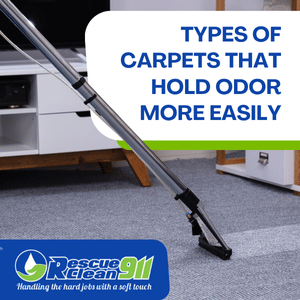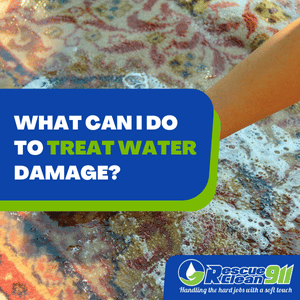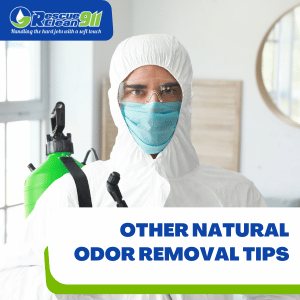How to Remove Odor From Carpet (Fast And Permanently)
Learning how to remove odor from carpet fast and permanently is essential to protect your health, preserve your flooring, and keep your living space inviting.
Even in the cleanest house, a smelly carpet can ruin the comfort and freshness of a room. Whether the cause is pet urine, spilled food, or lingering moisture, unwanted carpet smells can quickly spread through your home.
As a mold remediation and water damage repair company, we’re intimately familiar with these carpet odors. There are even situations when the carpet needs to be replaced. But with the right knowledge, you can make an informed decision about how to deal with carpet smells and what the next steps should be.
This guide explains the science behind carpet odors, provides proven home remedies and other natural ingredients, and outlines when to seek professional help for persistent or unpleasant odors.
How To Remove Odor From Carpet & Why Lingering Carpet Odors Are a Health Concern
Carpets are naturally porous, meaning they can trap bacteria, mold spores, dirt, and odor-causing compounds. Water damage, especially from leaks or floods, can turn your carpet into a breeding ground for mold and bacteria.
 Carpets naturally trap dirt, debris, and moisture within their carpet fibers. Over time, these materials break down, creating unpleasant odors.
Carpets naturally trap dirt, debris, and moisture within their carpet fibers. Over time, these materials break down, creating unpleasant odors.
High humidity and poor air circulation allow bacteria, mold, and mildew to thrive under and inside the carpet pad. In homes built on concrete slabs, trapped moisture beneath the carpet can make the bad smell worse.
As carpets age, their fibers begin to break down, releasing a musty “old carpet” odor. Pet accidents, food spills, or smoke can make matters worse, allowing urine, food, or chemicals to seep into the padding.
Moisture is one of the biggest culprits; it promotes bacterial growth and odor retention. When humidity levels stay high, carpets can reabsorb moisture from the air, trapping new odors even after cleaning. If your area rug or wall-to-wall carpet feels damp, odor-causing microbes are likely multiplying inside.
Pet accidents like dog urine or cat urine can further compound the problem, producing strong urine smells and pee smell that are difficult to remove without the right process.
Jump to a section:
Types of Odors Carpets Could Have
Carpets in homes in southern Florida can experience a range of wear and tear, leaving them with unpleasant smells. Paying attention to the particular smell can help you determine the cause of carpet odor and also how best to fix the issue.
 1. Pet Odors
1. Pet Odors
Pets bring joy, but they also leave behind hair, dander, and sometimes pee. Pet urine contains ammonia and proteins that cause nasty odors when not cleaned immediately. Over time, these odors become embedded in carpet fibers and even soak into the padding or wood subfloor beneath.
2. Moisture and Mold
If your carpet stays wet for too long after flooding, leaks, or high humidity, it can develop mold. Mold not only smells terrible but also poses a health risk. Its spores can travel through the air, affecting the entire room and other furniture.
Find out what steps to take if mold is discovered in your home by checking out our guide on what happens if mold is found during home inspection.
3. Spills and Other Contaminants
Food, drinks, or pet urine can introduce bacteria that thrive in warm, damp environments. When these bacteria feed on organic matter, they produce gases that smell foul. Even trash cans near the carpet can contribute to the odor if spills or moisture collect nearby.
Types of Carpets that Hold Odor More Easily
All carpets are naturally good at holding in odors because they are porous, and all the particles that cause odors, like mold spores, dust, and bacteria, can get caught in between the individual carpet fibers. But some carpet materials are more likely to trap odors than others. The four basic carpet materials are:
 Nylon – Nylon is the most common carpet material used in homes today. Nylon is a synthetic material that is good at resisting odors.
Nylon – Nylon is the most common carpet material used in homes today. Nylon is a synthetic material that is good at resisting odors.Polyester – Polyester carpet is another synthetic carpet that has natural resistance to stains but can hold odors if it gets wet.
Olefin – Olefin is a moisture-resistant carpeting material because water does not absorb into the fibers. This often means that odor-causing particles also cannot penetrate either, especially if the carpet is dried shortly after exposure to water.
Wool – Unlike other carpet fibers, wool is natural. This means it is more porous than plastic carpet fibers, but it does have some natural deodorizing capabilities, which can cut down on odors.
The pile of carpet, as well as the height or length of its fibers, can also impact its odor-retaining capabilities. High pile carpets will naturally take longer to dry and have more places for odor-causing particles to become trapped.
Regardless of the type of carpet, if there was enough water damage for water to seep through to the padding beneath, that layer can also retain moisture and odors that may necessitate cleaning or replacement.
Jump to a section:
What Can I Do to Treat Water Damage?
It is possible to save water-damaged carpets after flooding or pet accidents, both drying the carpets and removing all of the odor-causing bacteria and mold in the process.
This requires a proactive approach once you notice signs of water damage, and you will also need the right tools depending on how much water is present.
Tools Needed to Remove Odors From Carpets
The tools needed to remove a smell vary depending on the extent of the moisture, how long it has been sitting, and the cause of the smell. For a highly saturated carpet that is still noticeably wet, you may need:
 Submersible Pump
Submersible Pump Shop-Vac
Fans
Dehumidifier
For cleaning after any water damage, you will need
Absorbent Towels
Vacuum
Cleaning Agent
When choosing your cleaning agent, there are both store-bought and homemade ones available. You should avoid bleach as it will destroy the fibers of synthetic carpets and take the color out of wool.
24/7 LOCAL RESPONSE
Step-by-Step Guide: How to Remove Odor From Carpet Fast and Permanently
If you’re dealing with a smelly carpet, don’t panic. You can often rid your flooring of odors using natural cleaning methods and household products. Let’s walk through an effective process for odor removal.
Step 1: Identify the Source
Before applying any solution, locate the affected area. Pet accidents or water damage often leave visible stains or a strong urine smell. For new carpets, check under furniture and in high-traffic areas where odors might linger unnoticed.
Step 2: Remove Excess Moisture
Use a wet vac, absorbent towels, or a submersible pump to remove standing water. For pet accidents, blot the stained area with paper towels to soak up as much pee as possible. Avoid rubbing, as this can push the urine deeper into carpet fibers.
Step 3: Apply a Vinegar Solution
Prepare a vinegar solution (50% white vinegar, 50% water) in a spray bottle. Lightly spray the stained area to neutralize odors and bacteria. The vinegar smell will fade once the carpet dries. For dog urine or stubborn pet accidents, let the solution sit for a few hours before blotting with paper towels.
Step 4: Use Baking Soda for Odor Neutralization
Sprinkle a little baking soda over the affected area. Baking soda works to absorb odors from carpet fibers and neutralize the pee smell. Allow the soda to sit overnight or at least a few hours, then vacuum thoroughly. For heavily affected areas, repeat the process for optimal results.
Step 5: Dry the Carpet Completely
After cleaning, ensure the carpet dries fully. Use several fans and open windows to improve air circulation. Moisture left in carpet fibers can encourage mold growth and mildew, resulting in persistent odors.
Step 6: Consider Spot Cleaning vs. Full Cleaning
For small stains or pet accidents, just spot cleaning may be sufficient. However, for extensive water damage, widespread urine stains, or stubborn odors, professional carpet cleaning services may be required. Professional cleaning ensures the removal of odor-causing compounds and bacteria deep within the carpet fibers.
Jump to a section:
Deodorizing Musty Smells in Your Carpet – Does it Work?
There are many odor-neutralizing products on the market that promise to neutralize odors in carpet, and several recipes for treatments you can make yourself. These air fresheners will generally replace the odor with a more pleasant one for a little while.
However, they do not address the underlying problem, only masking it, and when the pleasant scent fades, you will still have musty carpets.
Other Natural Odor Removal Tips
 Cut onions can absorb bad odors when placed in a room for 24–48 hours. Surprisingly, the onion scent fades quickly, leaving behind a fresh smell.
Cut onions can absorb bad odors when placed in a room for 24–48 hours. Surprisingly, the onion scent fades quickly, leaving behind a fresh smell.A solution of vodka and water in a spray bottle can eliminate bacteria that cause a stubborn carpet smell.
If you have a basement or high-humidity area, use a dehumidifier to prevent mold and moisture buildup under your rug or furniture.
Always wash and dry any area rug thoroughly after cleaning to prevent mildew.
These methods are safe, chemical-free, and ideal for those sensitive to synthetic chemicals or with pets and children in the house.
When to Call for Professional Help
Sometimes, DIY cleaning isn’t enough. If your smelly carpet has been wet for days, or the odor lingers despite multiple attempts, you may need professional help. Trapped moisture can cause mold to grow deep beneath the carpet, in the padding, or even in the wood subfloor.
Experts in carpet cleaning can soak, extract, and clean these hidden layers to completely eliminate the source of the odor.
Professional cleaners use industrial-grade wet vac systems, enzymatic cleaners, and high-powered dryers to ensure the carpet dries properly. They can also test for hidden mold and recommend repairs if the ground beneath the carpet is compromised.
Jump to a section:
Let the baking soda sit for at least a few hours, ideally overnight, to fully absorb moisture and odor. Then vacuum thoroughly to lift residue and clean carpets effectively.
Yes. Combining white vinegar and baking soda can enhance cleaning power. First, spray vinegar, let it fizz, then blot and sprinkle soda. This helps eliminate nasty odors naturally.
If repeat cleanings fail, your carpet padding may be saturated. Professional help is recommended to deep clean carpets and ensure all trapped moisture and mold are removed.
No. Baking soda is gentle and safe for most carpet fibers. It’s one of the most effective natural deodorizers that won’t harm your rug or cause discoloration.
High humidity and concrete slabs often cause trapped moisture, allowing mold and bacteria to grow beneath the carpet. A dehumidifier helps prevent this recurring odor.
Only a Team of Professionals Will Banish the Scent – For Good
With the right process, natural cleaners like baking soda and white vinegar, and a little patience, you can clean carpets, eliminate bad smells, and enjoy a fresh start for your home.
Remember, moisture and bacteria are your main enemies. Act quickly when accidents or spills occur, allow your carpet to sit overnight with natural deodorizers, and repeat this process as needed.
You can call for professional help when you are unsure about what to do. Understanding how to remove odor from carpet is about more than cleanliness — it’s about creating a healthy environment.

Water Damage Restoration & Odor Removal
We Are Available
24 Hours a Day
Contact Us
Please let us know if you have a question, want to leave a comment, or would like further information about Rescue Clean 911.






